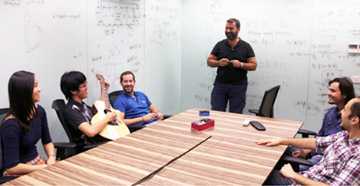Dimitris G. Angelakis Group
Classical computers require enormous computing power and memory to simulate even the most modest quantum systems. That makes it difficult to model, for example, why certain materials are insulators and others are conductors or even superconductors. R. Feynman had grasped this since the 1980s and suggested to use instead another more controllable and perhaps artificial quantum system as a "quantum simulator". Beyond applications in the quantum regime, quantum computers and simulators are expected to be able to solve difficult classical problems too in the area of machine learning and optimization. Recent advances in quantum technologies are paving the way as we speak for a second revolution where operational quantum devices are now within reach.
In our group, we are working on all aspects of quantum computing, from the basic science behind them to developing quantum algorithms and software for real world applications. We are theorists but keep close collaborations with all experimentalists in superconducting quantum circuits, room temperature light-matter systems, cold atoms and ions, and integrated photonic chips. We have recently edited two books, two special issues and written a review in our work. Examples of our basic science work include the quantum simulation of exotic phenomena thought to exist only in strongly interacting electronic systems with interacting photons: Mott transitions, spin-charge separation, interacting relativistic theories and many-body localization (the latter with the Google group). More recently we are interested to showcase useful quantum supremacy with analog many-body systems merging complexity theory to thermalization concepts as well as NISQ hybrid digital-analog algorithms for quantum machine learning, chemistry and QUBO problems. Finally, in addition to the "many-body stuff", we are also interested in the "few body" quantum effects found in nano-structures systems interfaced with light, topological physics, and quantum systems in general.
Beyond basic science, we are quite active in industry engangement and outreach, trying to spread the quantum gospel beyond the academic laboratories. Examples of our work include quantum machine learning algorithms for market research, quantum optimization for banking and supply chain.
For further information on collaborations, openings at internships, PhD or Postdoc level, or if you just want to talk to us, please email the group leader.
More information at our homepage: http://dimitrisangelakis.org/


Associate Professor
School of Electronic and Computer Engineering, Technical University of Crete
Dimitris G. Angelakis completed his PhD in quantum optics with Sir Peter Knight FRS at Imperial College London supported by the Greek State Scholarship Foundation. His PhD work in quantum light-matter interactions received the Valerie Myerscough prize in 2000, and also the Institute of Physics UK prize in 2002. In 2001 and at age 25 he was elected college research Fellow at University of Cambridge (St Catharine's JRF) and worked in the Department of Applied Mathematics and Theoretical Physics until 2007. A year after his move to Cambridge, the Centre for Quantum Computation in Cambridge was initiated by Artur Ekert, where he joined to work in implementations of quantum simulation and computation. He joined CQT at its inception in 2008 as a Principal Investigator after being a regular visitor and collaborator of the NUS quantum group since 2003. He is known among others for his pioneering work in quantum simulators using light-matter systems as well as qubit efficient quantum algorithms for industrial application with NISQ processors. He received the Google Quantum Innovation Prize in 2018.
Group Members

- Dimitris G. AngelakisPrincipal Investigator
- Muhammad Umer Research Fellow
- Gordon Yuan Ning MaResearch Assistant
- Maroua Marso Chairi El FellahResearch Assistant
- Harvey Fengrui Cao CQT PhD Student
- Chee Chong HianCQT PhD Student
Recent papers

- Ioannis D. Leonidas, Alexander Dukakis, Benjamin Tan, D.G. Angelakis. (2024). Qubit Efficient Quantum Algorithms for the Vehicle Routing Problem on Noisy Intermediate-Scale Quantum Processors. Advanced Quantum Technologies 7 2300309

- Elias X. Huber, Benjamin Y. L. Tan, Paul R. Griffin, D.G. Angelakis. (2024). Exponential Qubit Reduction in Optimization for Financial Transaction Settlement. EPJ Quantum Technology 11 52

- C.H. Chee, Adrian M. Mak, L.Daniel, Panagiotis Kl. Barkoutsos, D.G. Angelakis. (2024). Computing Electronic Correlation Energies using Linear Depth Quantum Circuits. Quantum Science and Technology 9 025003

- H.F.Cao, L.Daniel, D.G. Angelakis. (2023). Unravelling quantum chaos using persistent homology. Phys. Rev. E 107 044204

- L.Daniel, D.G. Angelakis. (2023). Topological data analysis and machine learning. Advances in Physics: X 8(1) 2202331

- J. Jirawat Tangpanitanon, J. Tangpanitanon, S. Thanasilp, Marc-Antoine Lemonde, Ninnat Dangniam, D.G. Angelakis. (2023). Signatures of a sampling quantum advantage in driven quantum many-body systems. Quantum Science and Technology 8 025019

- Yu He, Shiqi Xia, D.G. Angelakis, Daohong Song, Zhigang Chen, L.Daniel. (2022). Persistent homology analysis of a generalized Aubry-Andre-Harper model. Phys. Rev. B 106 054210










